
The Supreme Court of California is the highest and final court in the courts of the State of California. It resides in the State Building in San Francisco in Civic Center overlooking Civic Center Square along with City Hall. It also holds sessions in Los Angeles and Sacramento. Its decisions are binding on all other California state courts.
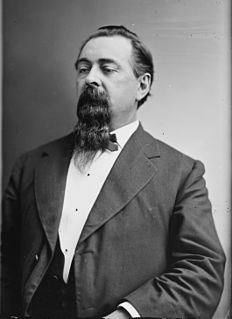
José Antonio Romualdo Pacheco, Jr. was a Californio politician and diplomat. He was elected and appointed to various California state and federal offices and posts throughout his more than thirty-year career, including serving in the California State Senate, as the 12th governor of California, and three terms in the United States House of Representatives. Pacheco remains the only Hispanic or Latino governor in the state's history as part of the U.S. He was also the state's first governor to be born in California and the only governor to be born in the state before statehood. Pacheco represented California in the United States House of Representatives as a Member of the Republican Party from March 4, 1877 to February 7, 1878, and from March 4, 1879 to March 3, 1883. He was the first Hispanic Representative from a U.S. state; several others had previously served as delegates for U.S. territories and as such did not have full voting privileges.
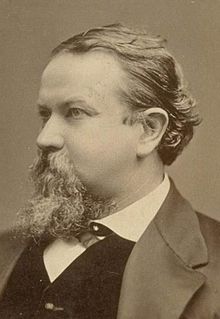
Milton Slocum Latham was an American politician, who served as the sixth governor of California and as a U.S. Representative and U.S. Senator. Latham holds the distinction of having the shortest governorship in California history, lasting for five days between January 9 and January 14, 1860. A Lecompton Democrat, Latham resigned from office after being elected by the legislature to fill the U.S. Senate seat left vacant by the death of David C. Broderick in a duel.

Henry Harrison Markham was a Republican United States Representative from California from March 4, 1885 to March 3, 1887. Declining to run for re-election to Congress in 1886, he ran four years later to become the 18th governor of California, serving from January 8, 1891 until January 11, 1895.
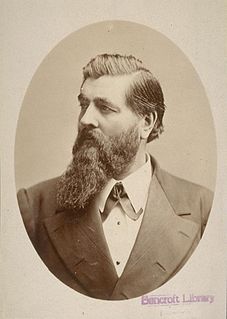
James Thompson Farley was an American politician.
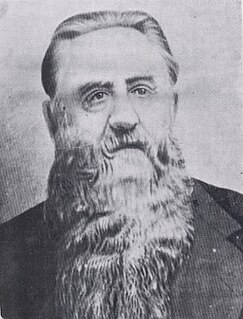
Lewis Rice "Broadhorns" Bradley was an American politician. He was the second Governor of Nevada in the United States from 1871 to 1879. He was a member of the Democratic Party.

The Constitution of California is the primary organizing law for the U.S. state of California, describing the duties, powers, structures and functions of the government of California. Following cession of the area from Mexico to the United States in the Treaty of Guadalupe Hidalgo that ended the Mexican–American War, California's original constitution was drafted in both English and Spanish by delegates elected on August 1, 1849, to represent all communities home to non-indigenous citizens. The delegates wrote and adopted the constitution at the 1849 Constitutional Convention, held beginning on September 3 in Monterey, and voters approved the new constitution on November 13, 1849. Adoption of the "state" constitution actually preceded California's Admission to the Union on September 9, 1850 by almost ten months.

John R. McConnell (1826–1879) was the fourth attorney general of California from 1854 to 1856. He ran in 1861 for Governor of California under the Southern Democratic party, but he lost to Leland Stanford.
The State Board of Equalization (BOE) is a public agency charged with tax administration and fee collection in the state of California in the United States. The authorities of the Board fall into four broad areas: sales and use taxes, property taxes, special taxes, and acting as an appellate body for franchise and income tax appeals. The BOE is the only publicly elected tax commission in the United States. The board is made up of four directly elected members, each representing a district for four-year terms, along with the State Controller, who is elected on a statewide basis, serving as the fifth member. In June 2017, Governor Jerry Brown signed legislation stripping the Board of many of its powers, returning the agency to its original core responsibilities.
Carlos Antonio Carrillo, was Governor of Alta California from 1837 to 1838. He took his oath as governor in Pueblo de Los Angeles, present day Los Angeles, on December 6, 1836. He was also the great-grandfather of actor Leo Carillo.

Lionel Allen Sheldon was a U.S. Representative from Louisiana. He was Governor of New Mexico Territory from 1881 to 1885.
Herschel L. Carnahan was the 30th Lieutenant Governor of California, 1928–1931, serving under Governor C. C. Young. He was a Republican. Following a suicide attempt at his office, he died at the Georgia Street Receiving Hospital in Los Angeles. He was interred at the mausoleum at Evergreen Cemetery in Riverside, California.
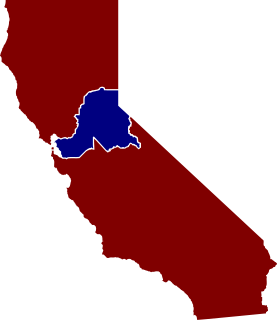
The United States House of Representatives elections in California, 1879 were elections for California's delegation to the United States House of Representatives, which occurred on September 3, 1879. California's delegation remained unchanged, at three Republicans and one Democrat.

The 1879 New York state election was held on November 4, 1879, to elect the Governor, the Lieutenant Governor, the Secretary of State, the State Comptroller, the Attorney General, the State Treasurer and the State Engineer, as well as all members of the New York State Assembly and the New York State Senate.

The 1879 Minnesota gubernatorial election was held on November 4, 1879 to elect the governor of Minnesota. Incumbent John S. Pillsbury was reelected to a third term.
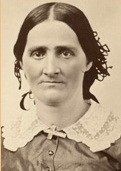
Harriet Burnett was the inaugural First Lady of California, wife of Peter Hardeman Burnett, governor from 1849–1851.
















